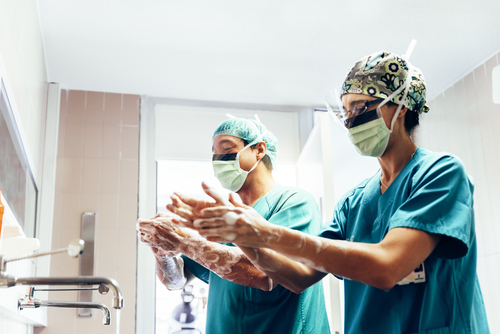
Hand hygiene has long been considered an important measure in preventing the transmission of germs, various diseases, and infections, but the COVID-19 pandemic has made even more people acutely aware of this highly effective and simple action.
Handwashing is an especially important habit for health care providers, not only for the protection of vulnerable patients, but for self-protection as well. For the safety and well-being of patients and in-office team members, Summit Health reinforces best practices and careful considerations at all facilities, including rigorous cleaning and disinfecting of all areas after use and, of course, handwashing.
Keeping your hands clean is one of the most important steps you can take to prevent not only the spread of coronavirus, but also influenza, common colds, gastrointestinal infections, and many other infectious illnesses. "When the pandemic began, one key piece of advice given repeatedly by the Centers for Disease Control and Prevention (CDC) and the World Health Organization (WHO) to avoid germs and decrease chance of exposure to COVID-19 was as simple as ‘wash your hands’," says family medicine doctor Eleanora Yeiser, DO. "We can't stress how important soap and water are in preventing disease. All someone has to do is regularly and thoroughly rinse their hands with soap under clean water,” she adds.
While hand washing alone won’t free the world from COVID-19 and other diseases, soap and water can do a lot to rid viruses from the surface of hands, which helps greatly in reducing spread.
Setting a Precedent for Washing Your Hands
In a post from February of this year, Summit Health outlined some important learned health habits to keep for life after COVID-19. In the article, Daniela Accurso, MD, a Summit Health family medicine doctor, explains how being proactive, not reactive, will benefit us down the road.
Following the Example Set By the CDC
In early 2020, the CDC released a guide to washing your hands and using hand sanitizer. Specifically, they urged Americans to wash their hands for 20 seconds or use a hand sanitizer with at least 60 percent alcohol.
Effectively Washing Your Hands
So, what is the right way to wash your hands?
- Wet your hands under running water. It doesn't matter if it's warm or cold water.
- Apply hand soap and lather your hands.
- Scrub for approximately 20 seconds and be thorough, making sure to get the backs of your hands, under your fingernails, and between each finger.
- Rinse off the soap with running water.
- Dry your hands using a clean towel or washcloth.
You can opt to use alcohol-based hand sanitizer if soap and water are not readily available.
You should always wash your hands after you:
- Use the bathroom
- Eat food
- Treat an injury, especially an open wound
- Cough or sneeze
- Care for someone who is sick
- Touch an animal, animal food, or clean animal waste
More Than Just a COVID-19 Precaution
Although COVID-19 is on all of our minds, it's not the only infection spread by poor hygiene. The influenza virus, in particular, is a common sickness best deterred by good hand hygiene. Since the flu spreads and infects people through air droplets via sneezes and coughs, sanitizing surfaces and washing your hands can directly stop an infection from occurring. A good tip is to wash your hands to the tune of 'Happy Birthday', which generally takes about 20 seconds to hum. This will bring you one step closer to preventing infections and viral transmission.
For more information about Summit Health and other medical knowledge, visit the Summit Health website and the Health and Wellness page.
